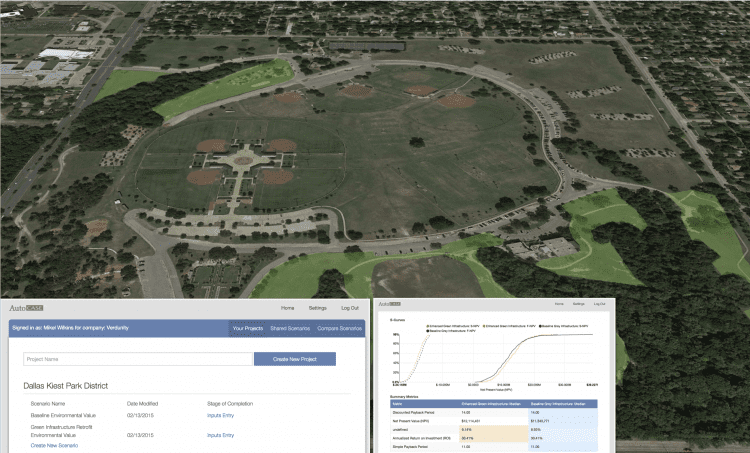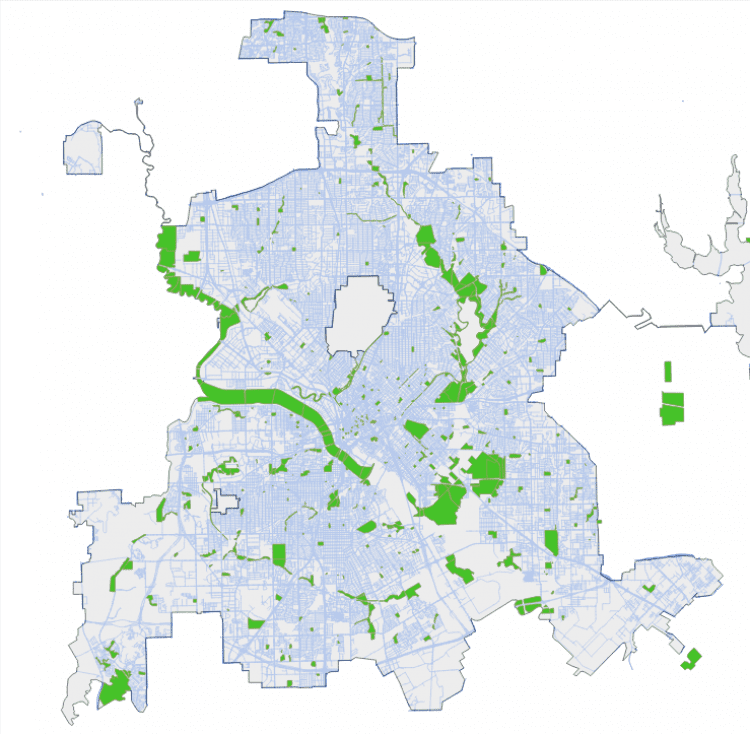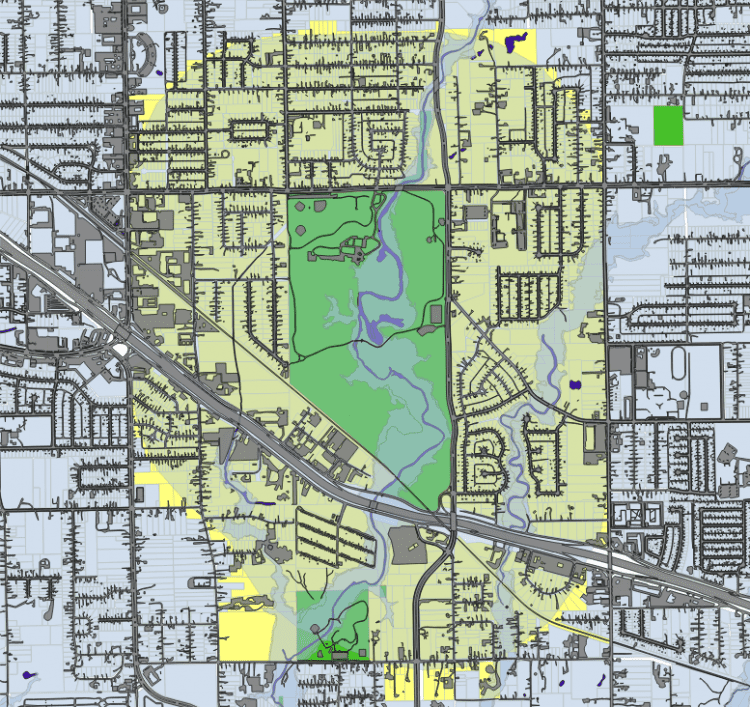Green Infrastructure: Dallas Works to Quantify the Value of Parks

The City of Dallas Park and Recreation Department (DPARD) manages and maintains one of the largest municipal park systems in the United States, including more than 21,000 acres of parkland consisting of 381 individual parks featuring more than 4,400 surface acres of water and 125 miles of trails. The park system serves one of the fastest-growing metro areas in the country.
This growth places unprecedented demand on the existing parks and trails, creating a need to expand and grow the system. It also creates environmental stressors related to increased population, such as water-quality deterioration, increased flooding, traffic congestion, diminishing water supply and poor air quality. Parks and trails offer many opportunities to mitigate these environmental impacts.

Figure 1. The Dallas park system consists of 381 individual parks.
Parks and trails are invaluable commodities in the urban realm. They provide a multitude of benefits that enhance quality of life, boost economic performance and help mitigate the environmental consequences of urbanization. The value of park systems is most frequently measured in terms of level of service provided to communities. This is an important metric, but it doesn’t scratch the surface of describing the full value of a parks system.
“Understanding park and trail value based on measurable and quantifiable data not only enhances credibility of the park system, but will result in a renewed quality,” said Samuel Stiles, director of the Dallas Parks Foundation.
Value Metrics
Park-department budgets frequently are cut or insufficiently increased because the system’s true value isn’t adequately communicated to leaders and stakeholders. Public infrastructure projects—including roadways and utilities—are consistently prioritized over parks and trails because the value metrics for these projects have been well established for decades. Establishing similar value metrics for park systems is imperative to ensure adequate funding and proper prioritization for new park and trail projects as well as maintenance of existing facilities.
The City of Dallas Park and Recreation Department identified a need to establish more-robust value metrics to convey the benefits provided by the overall parks and trail system. The city established a goal to define the true benefits provided by the system beyond traditional level-of-service measurements. The complete value story needed to include the park system’s capacity to enhance real-estate values, capture associated tourism benefits, leverage stakeholder contributions and provide measurable environmental benefits.
Combining these metrics … will create a compelling narrative about the true worth of the Dallas park system.
HR&A Advisors and VERDUNITY were contracted by the city to prepare a comprehensive economic value study that tells the complete story of the Dallas park system. Understanding and communicating the system’s overall value will serve as a catalyst for continued investment in the park system’s improvement and expansion. Specific goals of this study include the following:
- Establish consistent performance metrics for the Dallas Park and Recreation Department to track key performance indicators by park type and for the park system.
- Position Dallas parks competitively among national peers and understand strengths, weaknesses, opportunities and threats to economic development through park planning.
- Help prioritize park investments for the city and establish a strategic action plan for DPARD.
HR&A Advisors specializes in economic development, real estate and public-policy consulting, and it’s leading the economic value study project. VERDUNITY is a Dallas-based engineering and planning firm focused on planning and design of communities and infrastructure that minimize impacts on natural resources and maximize local productivity and resilience.
Environment and Livability
VERDUNITY was tasked with establishing value metrics associated with the environmental and quality-of-life benefits provided by the park system. The project team identified Impact Infrastructure’s AutoCASE software to translate these subjective criteria into real economic values. AutoCASE is a cloud-based solution that automates business-case analysis for infrastructure projects, using detailed project information to quantify financial, economic, social and environmental value.
VERDUNITY collaborated with Impact Infrastructure to develop a business-case evaluation tool related to environmental benefits provided by green infrastructure, which ultimately became the first module of AutoCASE.

Figure 2. To evaluate baseline stormwater management functions and property-value influence, the project team examined Crawford Park, Prairie Creek floodplain and its surrounding parcels.
Parks and open space offer many more benefits beyond aesthetic and recreational contributions. They provide immense value in reduced heat-mortality rates, improved walkability, higher property values, reduced air pollution, improved water quality, and a city’s capacity to retain and attract highly productive businesses and a talented workforce. VERDUNITY relied on AutoCASE to evaluate the Dallas park system’s overall value, including these important metrics, to tell the complete story of maintaining and enhancing the overall system.
The AutoCASE green infrastructure module, which analyzes the full spectrum of sustainable return on investment with a detailed focus on green infrastructure implementation, was used extensively in this analysis. The results produced a much broader view of the park system’s importance and will help develop a prioritization for retrofitting existing parks with green infrastructure. The analysis also will support planning for new stacked-function stormwater-management parks to greatly increase environmental, economic and quality-of-life metrics associated with the park system.
The study, which will be completed in May 2015, will evaluate the environmental values provided by five specific park typologies: 1) linear, 2) neighborhood, 3) community, 4) regional and 5) metro, and these typologies will be represented by five specific park case studies.
VERDUNITY is using AutoCASE to establish baseline environmental values for each case-study park based on values associated with operations and maintenance, recreational value, water-quality enhancement, flood protection, surrounding property values, heat-island mitigation and air quality.
Each of the case-study parks then will be evaluated to determine opportunities for green infrastructure implementation strategies that will maximize the value of environmental services. The capital costs associated with these implementation strategies will be combined with existing capital-needs assessments for the parks to establish a business case for retrofitting parks with green infrastructure strategies to optimize economic, environmental and social performance of public spaces throughout the city.

Figure 3. AutoCASE helped analyze Kiest Park for possible green infrastructure retrofits.
Establishing economic value metrics associated with environmental and quality-of-life services provided by the park system will change the perception of park value. Combining these metrics with values associated with tourism, increased property values and city brand building will create a compelling narrative about the true worth of the Dallas park system. The study will highlight opportunities to utilize green infrastructure strategies to create synergies with public-works infrastructure needs while enhancing the functionality of the existing park system and adding value to the community it serves.
View this related video:
About Mikel Wilkins
Mikel Wilkins is the Environmental/Sustainability program manager at VERDUNITY, with more than 20 years of environmental engineering and consulting experience working with municipalities, military installations and developers, with an emphasis on low-impact development and green infrastructure.


